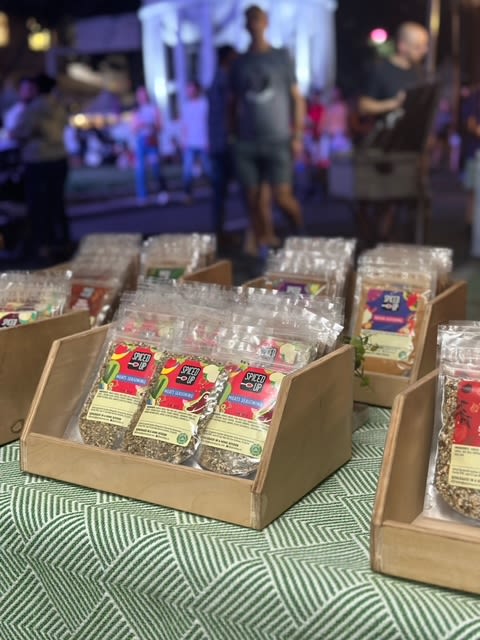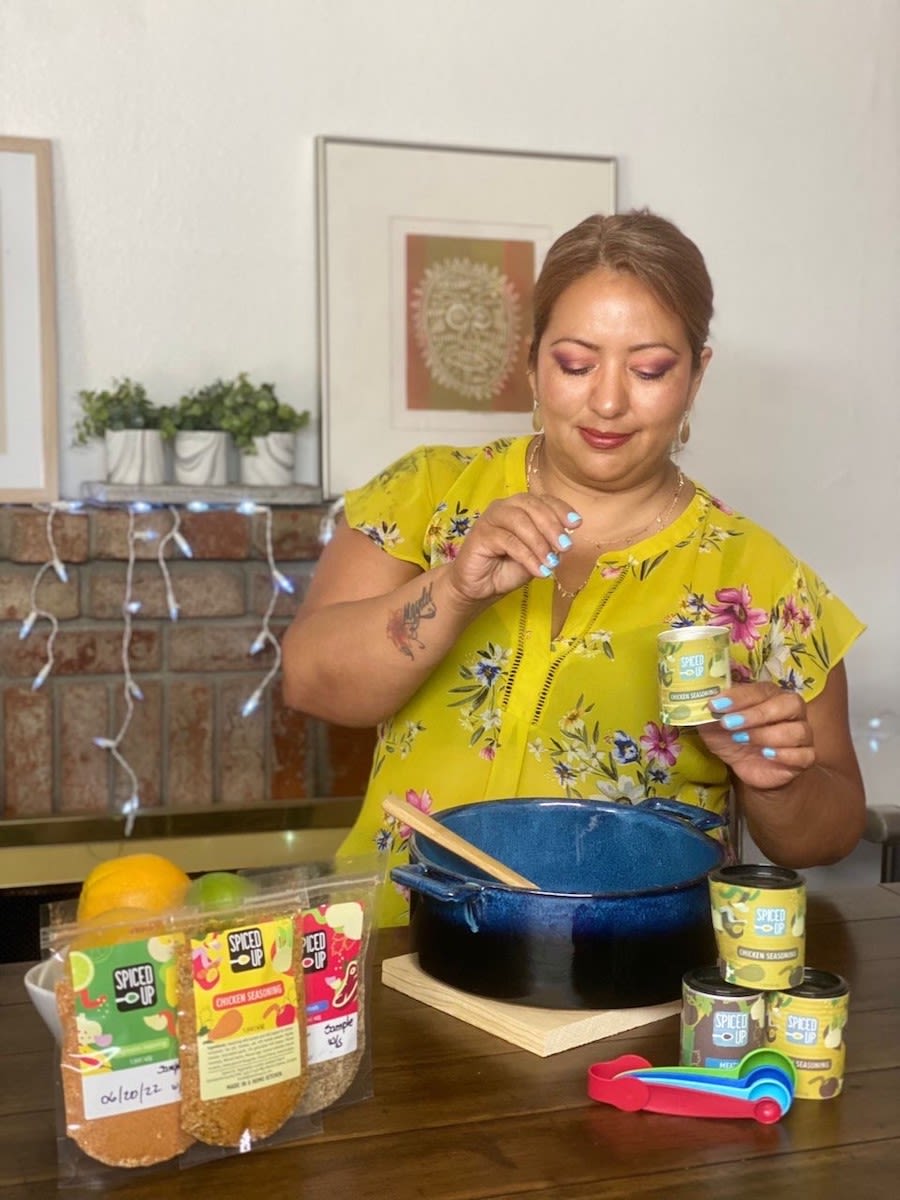As an immigrant entrepreneur, Massiel was turned away from traditional lenders, but a $10,000 Kiva loan was key in getting her business, Spiced Up, off the ground.
“You go to the bank, you say, ‘I have this idea’, but if you don’t have an established background, a good FICO score, etc., this [having an idea] doesn’t help you a lot. Fortunately, there are organizations like Centro and Kiva that help you.”
Massiel has embodied a growth mindset from the start. She had a business idea — hand-mixed spice blends that were organic and gluten-free — but knew that she would need guidance through the process of actually establishing the business and navigating regulations. In 2021, she completed an entrepreneurship program through Kiva U.S. Hub, Centro Community Partners, and this allowed her to take the first step in transforming her idea into reality. She defined her business structure, created a business plan, and learned about technical assistance as well as funding resources available to her — including Kiva.
The following year, Massiel applied for, crowdfunded, and received a $10,000 0%-interest, zero fee Kiva loan that would be key in getting her business, Spiced Up, up and running. She was thankful that Kiva took a chance on her, especially after she had been turned away from other forms of financing.
“You go to the bank, you say, ‘I have this idea’, but if you don’t have an established background, a good FICO score, etc., this [having an idea] doesn’t help you a lot,” she says. “Fortunately, there are organizations like Centro and Kiva that help you. This is incredibly important. This first step, the first boost. It’s so valuable for any small business.”
That first step is indeed key and aligns with Kiva’s aim to serve as the first rung of the capital access ladder for underserved and underestimated entrepreneurs who are otherwise financially excluded. 2 in 3 borrowers indicate that they have never borrowed money for their business before receiving their Kiva loan, and nearly 1 in 5 borrowers say they had no other financing options outside the Kiva loan. With no minimum credit score nor years in business requirement, the Kiva loan represents an accessible and affordable form of business capital with favorable terms – especially for startups like Massiel’s that do not yet have the history of financial stability nor track record which traditional lenders often look for.

Challenges to accessing finance as an immigrant entrepreneur
Massiel was not only turned away from more traditional lenders as result of her business’s startup status, but also because of her identity as an immigrant: Massiel left Venezuela ten years ago and sought a better life for herself and her family in the U.S. Lending discrimination and institutional barriers make starting and managing a business as an immigrant in the U.S. a challenging endeavor. And while local small business development policies that promote immigrant entrepreneurship are becoming more widespread, a lot of work remains to be done, especially considering the facts:
Immigrants make up 14% of the U.S. population, but own around a fifth of U.S. businesses.
Immigrant-owned businesses fuel the local economy, providing more jobs than non-immigrant-owned businesses.
Immigrants are 80% more likely to start a business than people born in the U.S., according to a new study co-authored by an MIT researcher in American Economic Review: Insights. This applies to firms in every size bucket (both growth-oriented startups and subsistence businesses).
Kiva, in partnership with such mission-aligned organizations as Centro, strives to bridge this gap and provide critical business capital to those who, as a result of longstanding structural economic inequities and discriminatory institutional practices, may not be able to access formal business loans elsewhere. Nearly 1 in every 5 Kiva U.S. loans goes to an immigrant-owned business. To date, the Kiva U.S. program has provided more than $13M in loans to more than 1,800 immigrant-owned businesses.
Massiel says she has referred several people she knows to Kiva, and they, too, have fully funded their loans.
“I think Kiva is marvelous,” she says. “Kiva supports my community, which is very important. They help immigrants who need this additional support - and not just financial support, but also support in terms of the knowledge of the processes associated with starting and running a business.”
Massiel used her Kiva loan to launch a new line of products that she had been working on, to develop more simple and eco-friendly packaging, and to continue building and improving her e-commerce platform. Some of the loan funds also went to inventory and raw materials, given that many of her sales came from local farmers markets in Sacramento and other events like Vegan Streets and Farm to Fork.
Advice and creativity were key to launch
Spiced Up started in Massiel’s kitchen — her daughter would call her, say her food was not turning out as good as her mom’s, and ask what spices she added.
“I saw various companies dedicated to this and thought, ‘This isn’t a bad idea.’ I have my own spice, my own style. So I started developing this idea. I thought about my daughter - what does she like to eat? She likes to eat organic, clean, healthy, avoiding chemicals.”
Massiel followed her curiosity and quickly started exploring and testing. When she went to the grocery stores, she noticed that the majority of the seasonings had salt, preservatives, and chemicals. And in a market that was already quite saturated, Massiel knew she would need to differentiate herself. With her daughter in mind, she started to define her target customer: someone who likes clean and healthy, but who’s also busy and does not want to have to buy separate spices, and wants to have the flavors together. In summary: specific spices for specific foods, in the form of an all-in-one-mix that epitomizes efficiency without sacrificing flavor. Massiel and her daughter cherish the memories from those early stages of product development:
“We created recipes together, I looked for recipes online, as well. I created them for her, she liked them. I started to experiment with different flavor combinations. That’s how I established my first ten recipes.”
Today, Spiced Up features 23 different flavors – a testament to Massiel’s creativity as well as openness to trying new things (literally). She participates in several local farmers markets in Sacramento as well as events such as Farm-to-Fork and Vegan Street Fair, and others in the Bay Area. At these direct sales events, Massiel is able to hear directly from her customers. She considers this feedback invaluable, emphasizing that it has helped her grow as an entrepreneur, improve her recipes and flavors, and explore other types of flavors that she might not have considered previously. She has also tweaked her product line, eliminating four not-so-great flavors and refining five fan favorites.

Massiel has big dreams for Spiced Up: next year, she hopes to get her brand into big grocery stores as well as Amazon. Both visionary and process-oriented, Massiel is intentional about taking the right steps to set herself up for success in the next phase of her business’s growth.
“Right now, I’m already looking into who could potentially do my packaging here in the U.S. I want packaging that’s recyclable, good for the environment [...]. I’m looking at the whole chain and planning how I’m going to do everything I need to do in terms of logistics in order to arrive at the shelves of grocery stores.”
Massiel attributes a large part of her success thus far to her daughter, not only because it was she who initially asked the question that prompted Massiel to seriously consider this as a venture, but also because she’s been able to draw on her experience working for a corporation and help her mom figure out some of those details along the way – from initial product development and testing to separation of company functions like marketing, finance, and sales.
“My daughter is like a consultant for me. I ask her for her advice. I tell her, look, this is happening in the business. Or I ask her if she likes a particular design. She’s our test customer - she’ll tell me, ‘I don’t really like this packaging.’ She’s also our designated taste-tester.”
Reframing, gratitude, and other lessons learned
Massiel is proud of what she’s built in the three years since starting Spiced Up, but she’s candid about the ups and downs, sacrifices, and moments of doubt along the way.
“I had to do this simultaneously with my other job. I was working to grow this small business, and at the same time, working for a paycheck. The business doesn’t generate revenue at the start. For this reason, the initial financing [I received from Kiva] was so important at the start, because one needs to put 100% of one’s energy into the business.”
About six months ago, Massiel was able to leave her other job, and is now solely focused on her business. Still, there are times when she considers quitting, but soon after such a thought, a significant online sale will come through, or a customer will provide a heartfelt compliment; and she feels a renewed sense of confidence.
Massiel is intentional about the way she talks to others who are considering starting a business of their own: “It’s not hard, but rather it’s challenging. I try to tell myself, ‘I don’t have problems, but rather I have challenges.’ And I think the secret is to persevere and keep going, knowing that it’s not always going to be that way.”
And this commitment to persevering, learning through failures, and reframing problems as challenges has paid off for Massiel so far. In a year and half, her business has grown six-fold, and she’s been able to bring on two team members: a web designer and a graphic designer. More than 4 in 5 borrowers report improved business success since receiving their Kiva loan, and Massiel, too, believes that the Kiva loan - still her only form of business financing to this day - and the ripple effects of the investments she was able to make, played a significant role in Spiced Up’s success.
“Everything requires learning, learning, learning. Every step that you take with your business, every change that you implement – it’s a fascinating world that I love.”
Necessary capital and the right mindset. These two ingredients were and remain key as Massiel continues to bring her vision to fruition.
“You'll never feel completely ready.... Running a business is a challenge. It’s not like you get the money and then tomorrow you have the store built / up and running and everything is moving along. No, it’s a process. You learn as you go. Your original vision transforms, grows, changes, because it’s dynamic. And each chapter of the journey teaches you something important.”
She’s grateful for the ups and downs, the rejections that ended up being redirections; and she looks forward to continuing to grow her business - and hopefully inspiring others to do the same.















